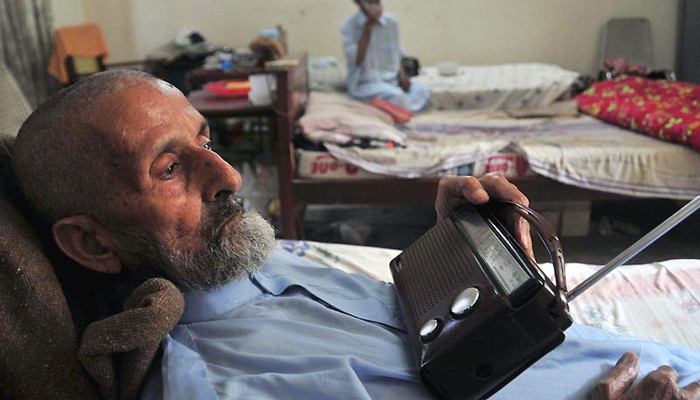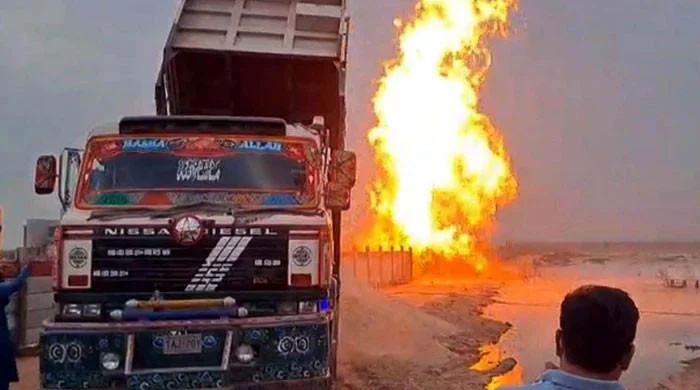Dotage vs COVID-19: How Pakistan’s old age homes are coping with the outbreak
“The government somehow missed the most vulnerable fraction [of the population],” remarks owner of old age home
April 29, 2020

In the fight against the mysterious contagion known as COVID-19, not everyone faces the same peril — a few stand to lose more than others.
It has now been widely accepted that factors such as immunity, age and general exposure have a definite role in who is more susceptible to contracting the disease.
Among places where extra vigilance is required to ensure the well-being of people, are old age homes where most residents, given their advanced age and failing health, are strong candidates for the pathogen.
The owner of one such old age home, Salim Gill, said his team is going the whole nine yards in order to ensure that all precautionary measures are strictly followed within the shelter’s premises.
He has been running Gills Shelter since 2008.
“We have stopped taking any new admissions at the moment since we don’t want the place to be overcrowded,” said Gill, stressing that hygiene and sterility always remains their top priority.
Other steps, such as reducing the number of residents per room, provision of masks and other safety kits — especially to those who suffer certain respiratory disorders — are also ensured by the management, he added.
When asked about the set meeting hours for family members, Gill said that given the present circumstances, the management has requested family members to contact their loved ones housed at the shelter home through phone or to maintain virtual contact through video calls or voice notes.
“We have also prohibited entry to any outsider during these days of crisis,” said Gill, adding that “an ounce of prevention is better than a pound of cure”.
The snowball effect
Gill, while sharing his concerns on how the elderly are predisposed to catching the disease owing to their age, said that residents at the shelter are “already grappling with a number of health issues”.
"Exposure to the contagious disease would exhaust their immune systems which with the passage of time are already deteriorating," he said.
Meanwhile, over at Darul Sakoon, which is a shelter for the homeless open to all ages, a social media campaign has been rolled out.
“In order to stem the spread of coronavirus among senior citizens, we have initiated social media campaigns edifying on the ‘do’s and don’ts’ of dealing with the disease,” said Enna Daniel, who is currently serving as a branch manager at the non-profit.
“With laxity and misinformation, we can only worsen things for those who already have a lot relying on their immune systems,” she added.
In this regard, Darul Sukoon has halted all its recreational activities and has issued directives for physiotherapists to conduct their sessions only for crucial patients — that too with extreme prudence and care.
“Since most of our residents are ones who were abandoned by their families, or have no one left in the world, we don’t have any visitors as such. However, we used to host a number of students, volunteers and other delegations, which has now been put on hold as per our safety measures,” said Daniel.
‘No facilitation from government yet’
The manager regretted that the government has not issued any particular Standard Operating Procedures (SOPs) for old age homes. “In fact, we have not been contacted for masks and safety kits either, given that we need them now more than ever” she said.
“Left with no other choice, we were compelled to buy overpriced masks,” she rued.
Putting similar concerns forward, Gill said: “I have been in touch with the management of other shelter homes and none of us has received word from the officials as yet.”
“However, earlier this month, the government issued a health advisory for the safety of citizens living in shelter homes across the country,” he said.
Gill said noted, adding that most shelter home residents are capable of looking after themselves, unlike old age homes where residents need looking after and without care, risks are doubled.
“The government somehow missed the most vulnerable fraction [of the population],” he remarked.
On the other hand, a representative from the Anmol old age home in Karachi, said that a team of Rangers had visited the facility a few days back and had handed out masks and sanitisers to the residents.
“They [Rangers’ team] also sprayed antiseptics to ensure sterility and cleanliness inside the premises,” he added.
‘Remember, we leave no one behind’
According to a statement by the World Health Organisation: “… All communities must be supported to deliver interventions to ensure older people have what they need. This support includes safe access to nutritious food, basic supplies, money and medicine to support physical health and access to social and mental health support and information to maintaining emotional well-being. All older people should be treated with respect and dignity during these times. Remember, we leave no one behind.”
Health experts around the globe have highlighted the need to take timely measures to mitigate the losses incurred due to the disease. A strict lockdown and government support is vital to shield the vulnerable in nursing homes, shelter homes and old age homes alike.
According to an estimate by the UN Population Fund (UNFPA), Pakistan will have 43.3 million elderly by 2025. Experts reckon the actual figure could rise even more due to better life expectancy.
Even though a study published in the Pakistan Journal of Public Health concluded that a majority of the elderly “didn't feel secure in leaving their home and living in a home with strangers”, the same study found that old age homes are preferred by people with chronic diseases or living alone.
With an expected rise in Pakistan’s aging population and no signs of the pandemic letting up any time soon, old age and shelter homes are in for a rough ride without government support.
“We are doing our best to protect our residents from the disease. However, we might not be able to continue [to keep our residents protected] if the authorities don’t step up to facilitate us,” admitted Daniel.











